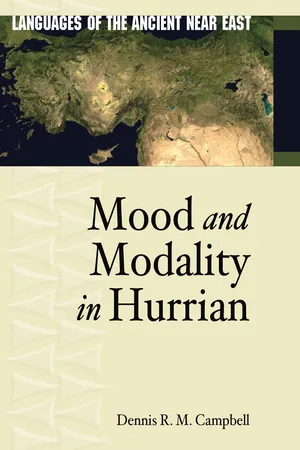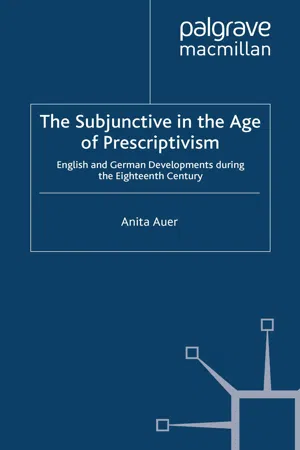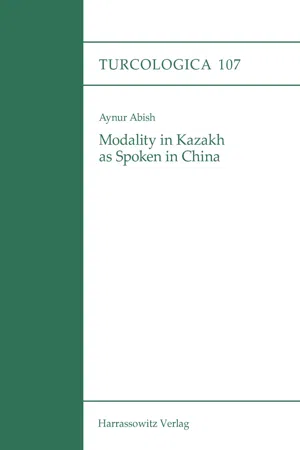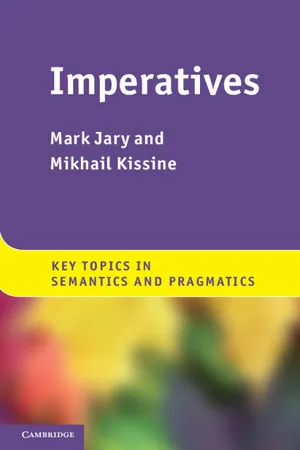Languages & Linguistics
Optative Mood
The optative mood is a grammatical mood that expresses wishes, hopes, or desires. It is used to convey a sense of possibility or potentiality. In some languages, the optative mood is marked by specific verb forms or particles, while in others it may be indicated through context or auxiliary words.
Written by Perlego with AI-assistance
Related key terms
1 of 5
6 Key excerpts on "Optative Mood"
- eBook - PDF
- Dennis Campbell(Author)
- 2015(Publication Date)
- Eisenbrauns(Publisher)
105 Chapter 6 Optative 6.1. Background In contrast to the imperative, jussive, and hortative, which have the primary function of issuing commands, the optative is used to express the wishes or desires of the speaker that a certain action or state be achieved. 1 The term optative traditionally refers to the Greek form used to express wishes of this sort. The Greek optative is not itself a sepa- rate mood but the “modal-past form of the subjunctive” (Palmer 2001: 205–7). The term has been semantically defined as indicating counterfactuality or remote possibility, 2 in contrast to the desiderative, which functions as a means for expressing desire, needs, or wants (Lyons 1977: 815). Optative has also been used for command or imperative para- digms in which a particular deontic mood is found with all persons and numbers. 3 Given the nature of the evidence for this mood in Hurrian, I follow here Bybee’s definition of the optative as the means of expressing the wishes and desires of the speaker and not as a type of direct command (Bybee 1985: 171). As demonstrated above, the imperative in Hurrian is morphologically limited to the second person and is used as a means for the speaker to issue direct commands to the addressee. The imperative, jussive, and hortative together form a suppletive Imperative or Command paradigm. 4 The optative is, however, a morphologically distinct form that has a complete paradigm, with every person and number being represented in the corpus (see table 6.3). The optative is primarily found in religious contexts and typically should be translated as an expression of the speaker’s desire or hopes that the gods (or some spiritual agent) perform a certain action. Of course, this usage is primarily a result of the text corpus in which it is found, and it does not indicate that this was a liturgical (or ritual) form to be used only in religious ceremonies. The form is translated here in most examples with the English modal “may.” 1. - eBook - PDF
The Subjunctive in the Age of Prescriptivism
English and German Developments During the Eighteenth Century
- A. Auer, Kenneth A. Loparo, Charles Jones, Charles Jones(Authors)
- 2008(Publication Date)
- Palgrave Macmillan(Publisher)
Vorlat describes grammarians such as Bullokar (1586), Greaves (1594), Hume (1612), Gill (1621), Butler (1634), Jonson (1640), Poole (1646) and Wharton (1654) as practical grammarians since they aimed ‘to favour, facilitate and advance the study of English grammar, so that both native speakers and foreigners may quickly obtain a speaking and reading knowledge’ (Vorlat, 1975, p. 10). The indicative, the imperative, the subjunctive, the optative and the infinitive mood, which were first introduced by Dionysius Thrax (second century BC), were regarded as the traditional set of moods. The optative was not a formally distinct mood in Latin but was neverthe- less adapted from Greek by labelling those subjunctive forms optative that were preceded by the word utinam and that expressed a wish (see Michael, 1970, p. 115). Roman grammarians regarded Greek grammar as a logical analysis of categories, which is why they even adopted terms for grammatical features which Latin grammar did not have, for example, the definite article and the Optative Mood (see Michael, 1970, p. 424). It is noteworthy that Greek itself lost the optative in the Alexandrian period. Nevertheless, it had become such an essential part in gram- matical thought that it is still listed in grammars of modern languages (Joseph, 1987, p. 70). In the Renaissance period, Thomas Linacre (c. 1460 to 1524) added a potential mood to the Latin system of moods, which was subsequently adopted into the English grammar. Linacre ascribes the following characteristics to it: ‘The potential mode signyfyeth a 18 The Subjunctive in the Age of Prescriptivism thing as mayying or owying to be done. And his sygnes in englysshe be these, may, might, wold or shuld, and hit hath V tens in every verbe of lyke voice to the subjunctive mode’ (Linacre, Progymnasmata, sig. Ciii, as quoted in Michael, 1970, p. 115). - eBook - PDF
- Aynur Abish(Author)
- 2016(Publication Date)
- Harrassowitz Verlag(Publisher)
Nor does it necessarily suggest that the realization of the event is de-pendent on the cooperation of the addressee or the subject referent (2009: 490, 2014: 39). Johanson (2014: 39) states that since the optative can refer to the future, it is sometimes called “optative-future”. The nuances of prospectivity appear, however, by virtue of the modal meanings. Situations described as desired, expected, or possible must belong to a time later than the moment of speaking. The prospective optative can be compared to the Indo-European prospective subjunctive and, for instance, the use of the English will . Decline of the optative Outside the northeast branch of Turkic, the optative experienced a decline, lost ground, and fell into decay. Of its once complete paradigms, only parts were pre-served. According to Johanson (2014: 42), in Tatar, Uzbek, etc. the simple marker is today almost entirely missing. The reason is that its semantics largely overlapped with those of the voluntative. The moods conveyed similar meanings, both signal-ing ‘it is desirable that...’. For the most part there were no clear-cut boundaries be-tween the types. The functions of the optative were largely taken over by the voluntative, forms of the hypothetical mood in {-sA 2 }, and the old present tense (“aorist”). Kazakh presently uses optative only in archaizing styles and in formulaic ex-pressions, e.g. Köp žasa-γ ay-sï ̣ ŋ ‘May you live long’. The third person optative {-G 4 A 2 y} at present has the tendency to be replaced by the voluntative third personal mood form {-sI 2 n}. However, the combinations of the optative marker and the past tense form of the copula, y ed ị , expressing an unfulfillable wish, are still be-ing used. 18 Usages Wishing The simple form of the Optative Mood expresses wishing, desire or hope in the sense ‘I wish …’, ‘May I/we do’, etc. In the first person singular, the addresser and the subject referents coincide. - eBook - ePub
- Goold Brown(Author)
- 2004(Publication Date)
- Perlego(Publisher)
Some of these auxiliaries convey other ideas than that of power in the agent; but there is no occasion to explain them severally here. The potential mood, like the indicative, may be used in asking a question; as, " Must I budge ? must I observe you? must I stand and crouch under your testy humour?"— Shakspeare. No question can be asked in any other mood than these two. By some grammarians, the potential mood has been included in the subjunctive, because its meaning is often expressed in Latin by what in that language is called the subjunctive. By others, it has been entirely rejected, because all its tenses are compound, and it has been thought the words could as well be parsed separately. Neither of these opinions is sufficiently prevalent, or sufficiently plausible, to deserve a laboured refutation. On the other hand, James White, in his Essay on the English Verb, (London, 1761,) divided this mood into the following five: "the Elective," denoted by may or might ; "the Potential," by can or could ; "the Determinative " by would ; "the Obligative," by should ; and "the Compulsive," by must. Such a distribution is needlessly minute. Most of these can as well be spared as those other "moods, Interrogative, Optative, Promissive, Hortative, Precative, &c.", which Murray mentions only to reject. See his Octavo Gram., p. 68. OBS. 4.—The Subjunctive mood is so called because it is always subjoined to an other verb. It usually denotes some doubtful contingency, or some supposition contrary to fact. The manner of its dependence is commonly denoted by one of the following conjunctions; if, that, though, lest, unless. The indicative and potential moods, in all their tenses, may be used in the same dependent manner, to express any positive or potential condition; but this seems not to be a sufficient reason for considering them as parts of the subjunctive mood. In short, the idea of a "subjunctive mood in the indicative form," (which is adopted by Chandler, Frazee, Fisk, S. S - eBook - PDF
Acquisition of Romance Languages
Old Acquisition Challenges and New Explanations from a Generative Perspective
- Pedro Guijarro-Fuentes, Maria Juan-Garau, Pilar Larrañaga, Pedro Guijarro-Fuentes, Maria Juan-Garau, Pilar Larrañaga(Authors)
- 2016(Publication Date)
- De Gruyter Mouton(Publisher)
This very brief overview of indicative/subjunctive mood uses in Spanish shows what have often been considered to be the two basic kinds of semantic triggers of the subjunctive: on one hand, expressions that entail the potentiality 144 Aoife Ahern, José Amenós-Pons and Pedro Guijarro-Fuentes or possibility of the proposition that they introduce; and on the other hand, as in the case of factive-emotive predicates, presuppositional environments (Ahern and Leonetti 2004; Ahern 2004, 2006). Still, there is no overall one-to-one rela-tionship between the type of interpretation that the subjunctive receives, and the type of linguistic environment; in this sense, mood integrates semantic, syntactic and pragmatic features. As will be seen in detail, certain types of linguistic environment allow both kinds of interpretation (potential and presuppositional), while discourse or extralinguistic contextual conditions determine which is more adequate. In the present study, we focus on one of those environments, namely, although (aunque) concessive clauses, in which the subordinate adjunct clause in sub-junctive can obtain either of these two types of readings. Thus, interpreting mood in concessives is clearly an interface matter, in which semantic, syntactic and pragmatic factors must be taken into account. 2.2 The pragmatics of mood interpretation Given the apparently diverse nature of semantic and syntactic properties that are involved in mood selection and in mood alternation in Spanish, it has often been concluded that the subjunctive must be understood as a grammatical element that is not amenable to any unitary semantic or syntactic account (Fábregas 2014). - eBook - PDF
- Mark Jary, Mikhail Kissine(Authors)
- 2014(Publication Date)
- Cambridge University Press(Publisher)
For instance, whereas a language may have a distinct form for the second-person- singular imperative, the subjunctive may be used as a polite form, as in Spanish, or it may be found in the negative imperative (sometimes called ‘prohibitive mood’). po cura deer kill ca pĩ jitep 2SG. wood cut 24 the data A further reason why verbal mood is important for better under- standing imperative (sentential) mood is that when speech acts per- formed using sentential-mood tokens are reported, there is often a systematic relationship with the verbal mood employed in the object clause of the reporting sentence. In English, an infinitive clause is used in (44) to report (45), while in Spanish a subjunctive is used in (47) to report the imperative (46). (44) Sit down. (45) He says to sit down. (46) Siéntate. sit-IMP.2SG.REFL. Sit down. (47) He tells me to sit down. In what follows, the terms ‘mood’, ‘the imperative mood’ or just ‘the imperative’, will mean mood in the sentential sense. If we speak about mood in the verbal sense, we will make this explicit. For us, the imperative in any language will be the form – if there is one – that is prototypically and productively used for the full range of directive speech acts. To reiterate, this is not to say that it is limited to that function, but rather that if it is found in a ‘neutral context’, then the most readily available interpretation is that a directive is being issued. Furthermore, to characterise a form as ‘imperative’ in our sense, it is not sufficient for it to be prototypically employed to issue directive speech acts: it is also necessary that there be no other function – speech-act type – with which it is prototypically associated. Our definition requires that any form that is correctly called ‘impera- tive’ be productive in its directive use, so that its most accessible interpretation is directive regardless of propositional content.
Index pages curate the most relevant extracts from our library of academic textbooks. They’ve been created using an in-house natural language model (NLM), each adding context and meaning to key research topics.





